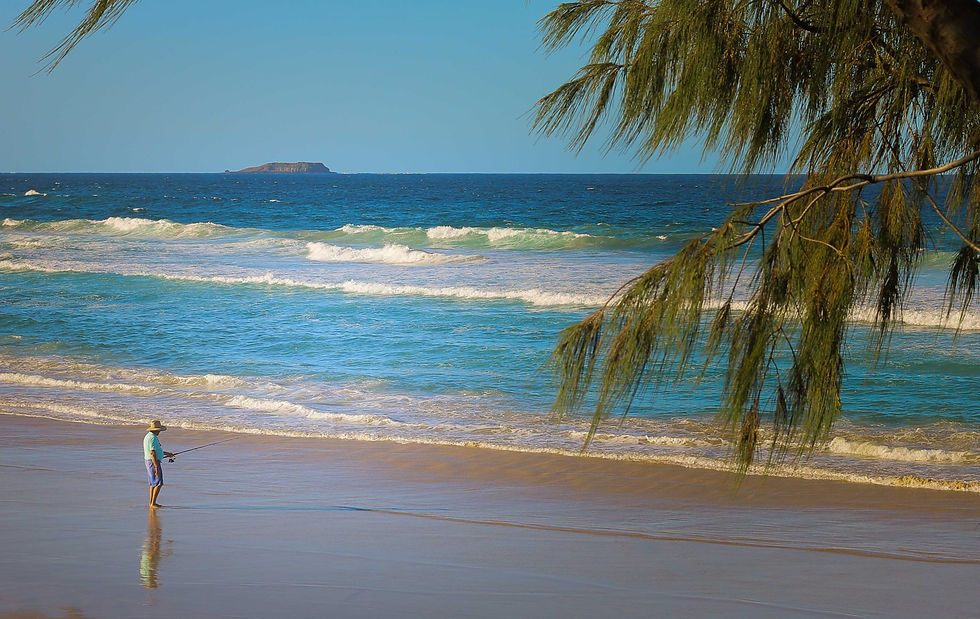Blue Mind, Better Life: How the Beach Rewires Your Brain for Calm and Clarity
- Melissa Hughes

- Jul 3, 2025
- 3 min read
Picture this: You haven't even packed your flip-flops, and yet you can already feel it—the sun warming your skin, the breeze tossing your hair, the hypnotic hush of waves rolling in, rolling out. You close your eyes, and the ocean’s soundtrack plays on cue.
That’s not just wanderlust whispering. That’s your brain responding to something ancient, primal, and scientifically powerful.
Summer may bring longer days and melty ice cream cones (or ice cold beer depending on your taste), but nothing hits quite like the call of the beach. And science says? There’s a reason we’re so drawn to it.
The Neuroscience of “Ahhh…”
Over the past few decades, neuroscience has unpacked how everything from chocolate to TikTok lights up the brain. But recently, researchers have turned their gaze to the natural world—and specifically, to the mental and physical benefits of blue spaces: oceans, lakes, rivers, and even fountains.
Turns out, these watery landscapes don’t just make for pretty vacation pics. They’re actually good for your brain. In fact, a growing body of research suggests that blue spaces may offer even greater health benefits than green ones. Why? It comes down to how water interacts with our sensory and nervous systems.
Sensory Overload Detox
Take a moment to think about what your brain’s dealing with right now. Traffic noise? Group chat notifications? The hum of a nearby fridge? Your brain is constantly filtering incoming noise—literal and metaphorical—to determine what matters and what to ignore.
But even ignoring things takes energy.
That’s where water works its magic. The beach gives your brain permission to take a break from high-alert filtering. The sounds are predictable, rhythmic, and soothing. The visual input is vast and uncluttered. The sensory experience whispers instead of shouts.
Welcome to the “Blue State of Mind.” Researchers at the London School of Economics teamed up with neuroscientists to test this theory using a smartphone app called Mappiness. Over 60,000 participants recorded their mood in real-time—across millions of moments.
The happiest people? Not in parks, not on mountain trails. Near water!
Those near oceans or coastlines reported feeling, on average, six points happier (on a 100-point scale) than those in urban environments. And we’re not just talking postcard views—just being near water, even briefly, offered a meaningful mood boost.
Brain scans back this up: When we’re near water, our brainwaves actually slow down, pulling us into a lightly meditative state. Just looking at ocean images can have that effect. Add the rhythmic sound of waves, and we’re halfway to Zen without even trying.
But it’s not just your brain. The beach also taps into your parasympathetic nervous system—the one responsible for that glorious rest-and-digest response. Unlike the fight-or-flight mode that fuels stress, this system slows your heart rate, lowers your blood pressure, and cues your body to chill out.
The ocean doesn’t just feel calming. It literally recalibrates your body’s stress response. That salty air? That endless horizon? That cool water lapping at your ankles? They’re not just poetic. They’re physiological.
So, the next time you find yourself craving the coast, know that it’s more than just a summertime itch. It’s your brain and body asking for a reset. Unplug. Sink your feet into the sand. Let the sun warm your skin and the waves wash over your senses.
That moment—when you realize your only real worry is whether the tide will reach your beach chair? That’s the blue state of mind.






Comments